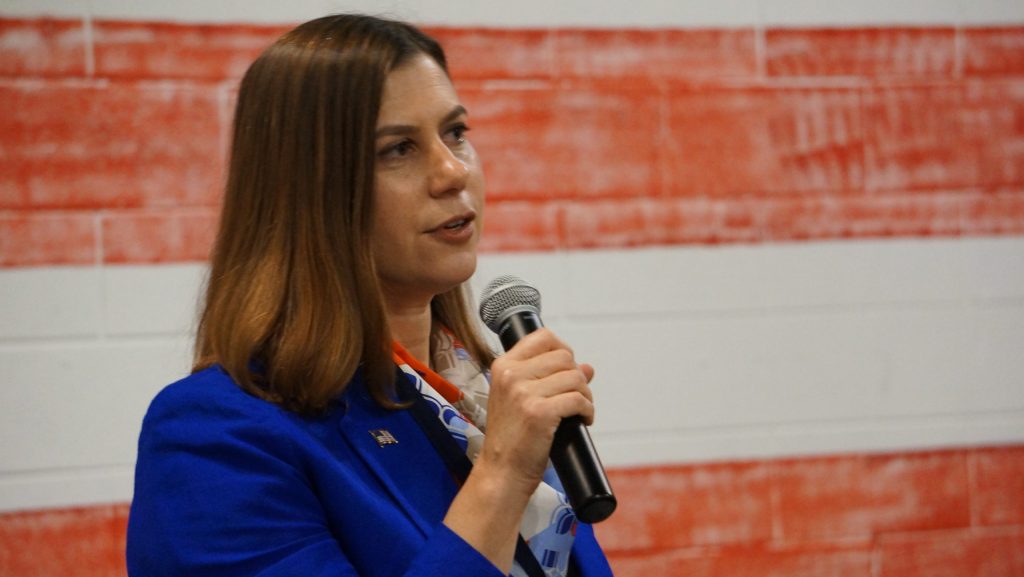Rep. Slotkin Warns of Vulnerability to Cyberattacks After Colonial Pipeline Hack
Slotkin says the Colonial Pipeline cyberattack that shut down a major gas line exposes the weaknesses in our infrastructure.

Rep. Elissa Slotkin in 2017.
National security experts say the recent hack affecting a major U.S. pipeline is just one in a wave of recent cyberattacks. Earlier this month, a cyberattack on the Colonial Pipeline shut down a major gas line that carries fuel to millions from Texas to New York. This shutdown sparked panic buying and price gouging along the East Coast.
“The way we control our infrastructure has modernized and it’s more online. It’s more network, and in general we think that’s a good thing. Except it just exposes all these vulnerabilities.” –Rep. Elissa Slotkin (MI-8)
While picturing the devastation of a terror attack or mass shooting is easy, visualizing a cyberattack is more difficult. But that does not make virtual attacks any less serious a threat to national security.
Listen: Rep. Elissa Slotkin (MI-8) discusses cyber threats, President Biden’s visit to Michigan and the conflict in Israel and Palestine.
Guest
Rep. Elissa Slotkin is a Democrat representing Michigan’s Eighth Congressional District. She is the chairwoman of the Intelligence and Counterterrorism subcommittee within the House Committee on Homeland Security. Slotkin says whether it is ransomware or an attack for disruption, the U.S. needs to ensure that its infrastructure is protected from these cyberattacks.
Slotkin says the recent pipeline cyberattack has proven to the average American that the U.S. is exceptionally open to cyberattacks. “The way we control our infrastructure has modernized and it’s more online. It’s more network, and in general we think that’s a good thing. Except it just exposes all these vulnerabilities.”
According to Slotkin, most members of Congress think about cybersecurity policies from two perspectives, the first being defense. “What would happen if, in Lansing, we had a major cyberattack on the state? What would happen if in the middle of winter, there was an attack on Michigan’s electrical grid and 26 elderly people froze to death in their home?” Slotkin says these scenarios are what the U.S. needs to prepare for.
“We’re not there as a nation, as a government, on how to respond to these attacks effectively.” –Rep. Elissa Slotkin (MI-8)
Slotkin says the second way of thinking about cybersecurity is through offense, which is more “sticky and complicated” because the U.S. has no doctrine for cyber war. “What the public I think sees, people can hack us, people can attack us in the cyber realm and there’s no response. And what I will tell you is yes, there is some response, it’s just we’re not there as a nation, as a government, on how to respond to these attacks effectively,” she says.
Slotkin also comments on President Biden’s visit to Dearborn on Tuesday for the unveiling of the new Ford F-150 Lightning electric pickup, which she also attended. Slotkin says it was a “surprisingly emotional day.”
But Slotkin says she talked with Biden about the urgent need to address supply issues.
“If we do not get our house in order on our supply chains, on the component parts that go into pretty much every car, we’re going to constantly be hamstrung and be at the will of, in particular, the Chinese and others who provide some of these vital pieces.”
“I think we are deeply hamstrung by the fact that Prime Minister Netanyahu sees this conflict as the way to save his political life.” –Rep. Elissa Slotkin (MI-8)
On the ongoing escalation in the conflict in Israel and Palestine, Slotkin says the U.S. response now must concentrate on protecting civilian life, and appears to support efforts to convince Prime Minister Benjamin Netanyahu to declare a cease-fire.
“Both sides need to respect the dignity of human life. And we need to bring this to a conclusion,” she says.
Netanyahu’s critics say he is using the conflict to stay in office after failing to secure enough votes to hold onto power in Israel’s recent election.
“I think we are deeply hamstrung by the fact that Prime Minister Netanyahu sees this conflict as the way to save his political life,” says Slotkin. “And I will be honest, I have been deeply disheartened by the lack of consideration by the prime minister to the conversations the administration has been having, and an attempt to have them privately.”
Web post written by Dan Netter
Trusted, accurate, up-to-date
WDET is here to keep you informed on essential information, news and resources related to COVID-19.
This is a stressful, insecure time for many. So it’s more important than ever for you, our listeners and readers, who are able to donate to keep supporting WDET’s mission. Please make a gift today.
